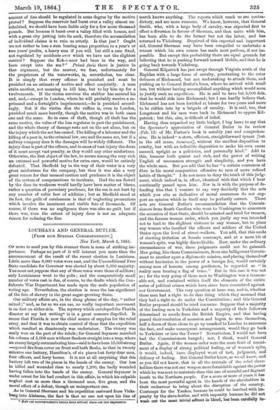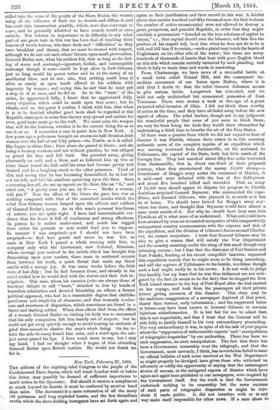LOUISIANA AND GENERAL BUTLER.
[FROM OUR SPECIAL CORRESPONDENT.]
New York, March 5, 1864. -Or news to send you by this steamer there is none of striking im- portance. Perhaps no part of it will interest you more than the announcement of the result of the recent election in Louisiana. Little more than 8,000 votes were cast, and the Unconditional Free State candidate for Governor was elected by about 3,000 majority. You must notsuppose that any of these votes were those of soldiers ; only Louisianans went to the polls ; and the comparatively small number of votes cast is due, of course, to the drafts which the Con- federate War Department has made upon the male population of voting age. Nevertheless, the election is none the less significant .of the fate of slavery in the great sugar-growing State.
Our military affairs are, in the slang phrase of the day, " rather mixed ;" and, as far as we can see, no really important movement is on foot on either side. The mystery which enveloped the Florida disaster at my last writing* is in a great measure dispelled. It .seems that Florida is now the chief source of supplies for the rebel army, and that it was to obtain control of these that the expedition which resulted so disastrously was undertaken. The victory was easily won on the part of the rebels ; for General Seymour marched his column of 5,000 men without Hankers straight into a trap, where an enemy largely outnumbering him—said to have been 15,000 strong —opened fire from cover on front and both flanks, so that in twenty minutes one battery, Hamilton's, of six pieces lost forty-four men, four officers, and forty horses. it is not at all surprising that this battery left two of its pieces in the hands of the enemy. Our loss in killed and wounded rises to nearly 1,200, the badly wounded having fallen into the hands of the enemy. General Seymour is under arrest for his bad conduct in this affair, in which his culpable neglect cost us more than a thousand men, five guns, and the moral effect of a defeat, though an unimportant one. As to General Sherman and his expedition eastward from Vicks- burg into Alabama, the fact is that no one not upon his line of
• BM our correspondent's letters have arrived since our last impression. march knows anything. The reports which reach us are contra- dictory, and are mere rumours. We know, however, that General Smith, who, with a large body of cavalry, was expected first to effect a diversion in favour of Sherman, and then unite with him, has been able to do the former bnt not the latter, and has returned to Vicksburg. Deprived of this expected and important aid, General Sherman may have been compelled to undertake a retreat which his own course has made most perilous, if not im- possible. But except this probability there are equal grounds for believing that he is pushing forward toward Mobile, and that he is going back towards Vicksburg.
General Kilpatrick has just swept through Virginia south of the Rapidan with a large force of cavalry, penetrating to the outer defences of Richmond, but not undertaking to attack them, and pushing on to General Butler's lines, where he arrived with small loss, but without having accomplished anything which would seem to justify such an expedition. He is said to have bet 5,000 dole. that he would ride into Richmond; but I can hardly believe that. Richmond has not been fortified at leisure for two years and more to be ridden into by a brigade of cavalry. It is said, too, that Longatreet and his men were back in Richmond to oppose Kil- patrick ; but this, also, is difficult of belief.
Having thus unpacked my little budget, I beg leave to say that the Spectator's appreciation of General Butler in its review (Feb. 13) of Mr. Parton's book is notably just and comprehen- sive. He is indeed " a stern, efficient, straightforward tyrant [but in the old sense, turannos], without the smallest disposition to cruelty, but with an inflexible dispositiou to make his own cause succeed, upright as a politician, and personally kind." Add to this, humour both quaint and rich, and the power of writing English of uncommon strength and simplicity, and you have the whole man. But you add that he has " a certain coarseness of fibre in his moral composition offensive to men of more refined habits of thought." I do not mean to deny the truth of this judg- ment, which indeed is, in effect, identical with that which I hear continually passed upon him. Nor is it with the purpose of de- fending him that I venture to say very decidedly that the acts which you cite as indicative of moral coarseness do not sup- port an opinion which in itself may be perfectly correct. Those acts are General Butler's recommendation that the Commis- sioners from South Carolina who went to Washington to announce the secession of that State, should be arrested and tried for treason, and the famous woman order, which you justly say was intended not to lead to the slightest violence to any woman, but to place any woman who insulted the officers and soldiers of the United States upon the level of street-walkers. You add, that this mode of showing irritation at female contempt, and at a mere bit of woman's spite, was highly discreditable, Now, under the ordinary circumstances of war, these judgments could not be gainsaid. Men going, like those Commissioners, from one belligerent Govern- ment to another upon a diplomatic mission, and placing themselve without hesitation in the power of a foreign foe, would certainly among men of honour, among gentlemen, be regarded as " in reality men bearing a flag of truce." But in this case it was not so ; for the very going of those men to Washington was a treason-. able act, and contained within itself the elements of the entire series of political crimes which have since been committed against our Government. The very question at issue was, and is, whether those men had a right to do that thing which they assumed that they had a right to do under the Constitution ; and this General Butler proposed should be tried instanter. Suppose that a majority of the leading men in Yorkshire and a majority of their followers determined to secede from the British Empire, and that having passed their resolution of secession and begun to arm themselves, half a dozen of them chose to go up unasked to London to announce the fact, and make consequent arrangements, would they go back to Yorkshire or into the Tower ? Nevertheless, I would not have had the Commissioners hanged ; nor, I think, would General Butler. Again, if the woman order were the mere fruit of resent- ment of a display of strong political feeling, or of woman's spite, it would, indeed, have displayed want of tact, judgment, and delicacy of feeling. But General Butler knew, as we all knew, and as you did not know, that in all the arsenals of the rebel slave- holders there was not one weapon more formidable against the power which he was sent to maintain than this one of scornful and flagrant insult to the Northern people. For a score or more of years it has been the most powerful agent in the hands of the slaveholders in their endeavour to bring about the disruption of the country. Contempt for the Yankee, because he could be insulted with im- punity by the slave-holder, and with impunity because he did not wash out the most trivial affront in blood, has been carefully in-



































 Previous page
Previous page